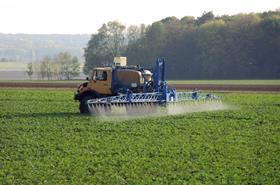
Cocktails of pesticides commonly found in UK food, water and soil may be harming human health and wildlife, a new report has revealed.
Released today by Pesticide Action Network UK and the Soil Association,The Cocktail Effectreveals around a quarter of all food, and over a third of fruit and vegetables, consumed in the UK contain a number of pesticides, with some containing traces of up to 14 different chemicals.
It also details evidence of pesticide cocktails in the environment, with mixtures of as many as ten different chemicals found in UK soil and water with the potential to affect wildlife such as birds and bees.
The report warns that post-Brexit trade deals could lead to a rise in the number of pesticides authorised for use in the UK and an increase in the level and variety of pesticides permitted in food. Both outcomes have the potential to increase the exposure of the public and environment to potentially dangerous pesticide cocktails
Josie Cohen from PAN UK said:“Because of the overuse of pesticides in UK agriculture, we are constantly exposed to a wide array of different chemicals which can interact to become more toxic, creating a ‘cocktail effect’.
“Yet the government continues to assess the safety of just one pesticide at a time. The truth is we simply have no idea of the human health and environmental impacts of long-term exposure to hundreds of different pesticides.”
The Soil Association added that the report’s key findings make for “sobering reading” and confirm that the cocktail effect is a “significant enough problem to warrant further attention”. In 2017, 87 per cent of pears, 64 per cent of apples and a quarter of bread contained pesticide cocktails.
The government’s testing data for 2018 shows residues of 157 different pesticides, including 63 known, possible or probable carcinogens, and 41 suspected endocrine disruptors.
When it comes to the environmental impact, the report reveals that 67 per cent of the soil tested contained pesticide cocktails, as did two-thirds of samples taken from seven river catchments. Another study found that 43 per cent of pollinators had detectable levels of two or more pesticides.
The report also brings together a range of scientific studies showing that pesticides cocktails can be harmful even when each individual chemical appears at levels at or below its “no-observed-effect-concentration”.
Health effects revealed include obesity and impaired liver function, the creation of cancer cells and disruption of the endocrine system. Studies looking at insects, fish and birds echo these results.
In just one example, a certain insecticide touted as a ‘safe’ replacement for neonicotinoids and a commonly used fungicide were shown to combine to be more toxic to bees than when either chemical appears alone.
Despite being acknowledged as a problem almost two decades ago, the UK regulatory system largely fails to monitor the cocktail effect. While the government conducts limited testing for pesticide cocktails in food, it fails to assess or limit the sum total of pesticides to which the environment and wildlife are exposed.
While various efforts are underway by researchers to create a system capable of monitoring the cocktail effect, The Soil Association believes it is unlikely that any will be sophisticated enough to accurately assess the health and environmental impacts of millions of different pesticide combinations in our food and landscape. The only way to minimise the risk is to hugely decrease our overall pesticide use, the group argues.
“The UK government has committed to reducing pesticide use, but the support farmers need to transition away from pesticides simply isn’t in place,” said Rob Percival from the Soil Association.
“The government urgently needs to support farmers to adopt nature-friendly, agroecological approaches that don’t rely on pesticides, including organic, to better protect both human health and the natural world.
“Brexit poses real threats to food and farming, but it also provides an opportunity to do things differently, if the right policies and legislation are put in place.”
The report makes a number of other recommendations to the government, including calling for the introduction of a pesticide reduction target and a system for monitoring the impacts of pesticide cocktails on human health and the environment.
It also urges the government to ensure that post-Brexit trade deals with non-EU countries don’t disadvantage British farmers and consumers by allowing an influx of poor quality food coated in pesticide cocktails.



